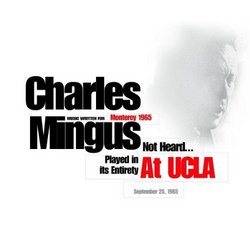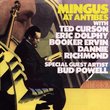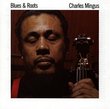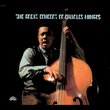| All Artists: Charles Mingus Title: At UCLA 1965 Members Wishing: 2 Total Copies: 0 Label: Universal Original Release Date: 1/1/2007 Re-Release Date: 5/15/2007 Album Type: Import, Live Genre: Jazz Styles: Avant Garde & Free Jazz, Modern Postbebop, Swing Jazz, Bebop Number of Discs: 2 SwapaCD Credits: 2 UPC: 602498427590 |
Search - Charles Mingus :: At UCLA 1965
 | Charles Mingus At UCLA 1965 Genre: Jazz
|
Larger Image |
CD DetailsSimilar CDs
|
CD ReviewsBeyond superlatives Larry Sakin | Tucson, AZ | 09/30/2006 (5 out of 5 stars) "Last week was the 40th anniversary of a seminal event in jazz history. On September 25, 1965, composer/bassist/pianist Charles Mingus and his octet lumbered into a small auditorium on the UCLA campus to perform one of the open workshops Mingus became famous for. It was an event that allowed a select audience to watch a jazz master at work, struggling to make sense of the music in his head and lay a foundation for his group to interpret that music. Charles Mingus At UCLA 1965 is a no holds barred, unapologetic look at Mingus' genius; the frustration, anger and ultimate exaltation he felt while his music took shape. Originally released as an LP in 1967, Mingus was only able to press 200 of the double album set before running out of money. A few years later, Mingus discovered the masters had been destroyed when Capitol Records cleaned out their vaults. This CD set, put out by Mingus' widow on her Sue Mingus Music label, is a testament to the contentious style her husband employed to re-create the art that burnished his soul. To say this album is brilliant doesn't do it justice. There aren't enough superlatives in the English language to describe the effect this album will have on any Mingus or jazz aficionado. Mingus' sterling backup band on this album includes Hobart Dotson on and Lonnie Hillyer on trumpets; Jimmy Owens on flugelhorn and trumpet, Charles McPherson on alto saxophone, Julius Watkins on French horn, Howard Johnson on tuba, and Dannie Richmond on drums are all impeccable, even though after a few false starts on "Once Upon A Time, There Was A Holding Corporation Called Old America" Mingus dismisses Dotson, Owens, Watkins and Johnson "to the back room to figure this thing out." It's not malicious--some of the compositions were so raw at the time of this concert its surprising there weren't more false starts then there were. Although some may not appreciate the rough edginess of the songs Mingus workshops, these unpolished gems give listeners the opportunity to explore with Mingus as the compositions ascend from drafts to a final product that has Mingus shouting in joyful acknowledgement of completion. It's a searing experience. As a quartet, Mingus, Hillyer, McPherson and Richmond do a shattering version of "Ode To Bird and Dizzy", and the full octet shines on "They Trespass the Land of the Sacred Sioux", "The Arts of Tatum and Freddy Webster", "Muskrat Ramble", and "Don't Be Afraid, the Clown's Afraid Too". The album ends with "Don't Let It Happen Here", a Mingus poem which is a vanguard in response to current political turmoil. Charles Mingus was years ahead of his time, constantly pushing the boundaries of jazz to its furthest extremes. Nearly thirty years after his death, musicians are still untangling Mingus' complex compositions, adding their own bents to his musical vision. The re-released document of the 1965 UCLA workshop further enhances Mingus' vision and will keep new composers busy for a long time trying to capture his magic in their own work. " Uneven music and recording, fascinating journey into the cre Samuel Chell | Kenosha,, WI United States | 09/26/2006 (5 out of 5 stars) ""Mingus at UCLA 1965" is a remarkable document, possibly the most important music release of 2006, providing your criteria extend beyond mere audio quality and musical precision. This was not a concert but a Mingus "workshop," as he insisted on calling such affairs. Mingus wanted the audience to experience the creative process as much as the product. Consequently, to the extent that the recording omits visual information relevant to that process the accompanying notes in the form of Sue Mingus' elegant prose are arguably integral with the music on the two discs. Mingus had planned to premiere a large body of compositions at the September 1965 Monterey Festival, but his time on stage was limited to under thirty minutes, precluding the performance of most of the new material. A week later, the bassist-leader and his ensemble would perform the complete concert at UCLA. Subsequently, Mingus would obtain the tape made by amateur UCLA sound technicians and press a mere 200 double-LP sets for sale on his own mail-order label. The music has not been released on CD until now. The listener can't help but notice that Mingus is surprisingly sensitive to his youthful student audience, at one point catching and practically reprimanding himself for using the word "hell" in their presence. It's true that following two false starts on one of the compositions ("Once Upon A Time, There Was A Holding Corporation Called Old America"), he first berates his musicians (the most humorous moment on the recording), then dismisses half the band for their "mental tardiness," sentencing them backstage to get their act together. But the temperamental leader evidences an equal amount of love and respect for his musicians during the program. As for the music itself, start with Mingus' choice of the instrumentation for his octet. It could be argued that the three trumpet players get in each other's way and, furthermore, do not serve to strengthen the textures of Mingus' bass-led harmonic progressions. Perhaps Julius Watkins' French horn was chosen to cover some of the registers normally assigned to Jimmy Knepper's trombone as well as to afford opportunities for satiric commentary (given the instrument's iconic association with "legit" music). At least the inclusion of Howard Johnson's tuba makes eminent sense, not only because of its undeniable contribution to the Dixieland number ("Muskrat Ramble") but because it permits Mingus to switch to piano without any drop-out in the bass part. Although it's clear that Mingus isn't happy with the music until the second half, the present listener may have a preference for the music on the first disc, in part because of its superior audio quality. The opening composition, "Meditation On Inner Peace," is a stunning invitation, featuring the leader playing a rich bowed solo in the cello register over an unabated drone tone supplied by tuba. Gradually the mournful musical prayer acquires intensity as the other players make their individual contributions to the surging layered threnody, which reaches a sonic and emotional climax with the addition of drummer Dannie Richmond's percussive thunder. Despite considerable distortion on the CD, the audience is clearly impressed by trumpeter Hobart Dotson's soloing leading off the second half, and Mingus is so unmistakably pleased that he expresses regret the band did not start there, proclaiming "everything is fine now." The ensemble remains in Mingus's good graces thoughout the third, primarily successful, attempt to perform "Once Upon A Time, There Was A Holding Corporation Called America," during which Mingus is at his manic best, hollering to his old pal, Dannie Richmond, "Love, Dee. It's you and me." Soon the joyous leader is singing along with the music in a piercing falsetto, perhaps to feed the musicians their parts but more likely to express his irrepressible ecstasy over its successful realization. Unfortunately, the singing adds to the considerable audio distortion, directing attention away from the music itself to its effect on its creator. Some listeners will no doubt dismiss this latest Mingus entry as marginally listenable music obviously recorded by non-professional technicians--perhaps an understandable reaction. But to the extent that Mingus' name and mystique extend beyond his music, continuing to attract and fascinate new listeners, this recording of the enigmatic, volatile composer's UCLA performance could be regarded as an indispensable "document," filling in another piece of the puzzle that is the artist while providing privileged insights into the creative process itself. Altoist Charles McPherson is quoted as saying that learning the music was especially trying as the composer not only denied the musicians written parts but changed his mind every day. Mingus represents not merely the burden of artistic genius but the composing process in each of us writ large. Far from being a megalomaniac or fixed ego, he's the insecure child persistently, valiantly, heroically working to assemble a genuine human identity, which for any of us must necessarily be a work in process. Or, as his widow Sue quotes him, "I'm trying to play the truth of what I am. The reason it's difficult is because I'm changing all the time."" Out of chaos, a cohesive statement o dubhthaigh | north rustico, pei, canada | 10/11/2006 (4 out of 5 stars) "We should all thank Sue Mingus for releasing the gems from the Mingus vault, and this one is a keeper. I gather from the chat that Mingus had been scheduled top play at the Moneterey Festival, but that his set got cut short. So he unrolls the whole thing here at UCLA. As always with Mingus there is a political and social subtext to the performance and in this case that reaches a very poignant peak with the closing "Don't Let It Happen Here." Before you get there though, and particularly on the first disc, there is a wild ride that seems completely out of control. You have Mingus introducing and backing up on comments as he goes along, there are false starts and deconstructed endings that leave you wondering what in the name of whoever is going on. The music is complex and difficult, and yet in the midst of whatever cataclysm is busrting, somehow the blues or swing breakout. It is an unbelievable ride. The focus increases on the second disc, but make no mistake about it, the compositions freely swing from free cacaphony to brilliant standard big band with a restless energy that gathers you in.
This aint your Grandad's big band. As I said, we owe Sue Mingus a huge debt of gratitude. Mingus was one of a kind, and especially live, as his enthusiastic howls in the course of "Once Upon a Time..." demonstrate. This is bold, adventurous and as out there as Miles, Trane and the Ornette from this volatile period." |

 Track Listings (19) - Disc #1
Track Listings (19) - Disc #1

